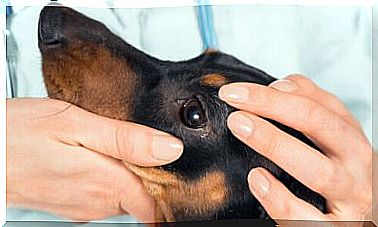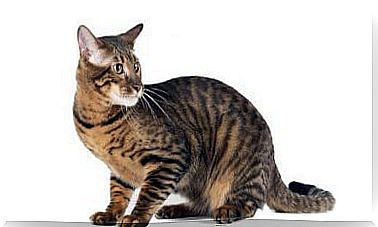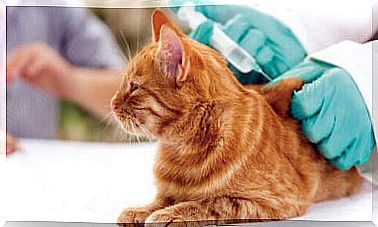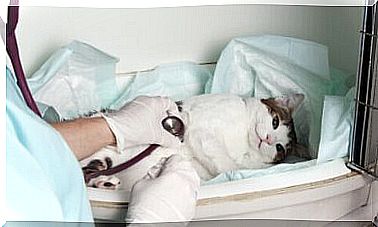Symptoms Of Health Problems In Cats
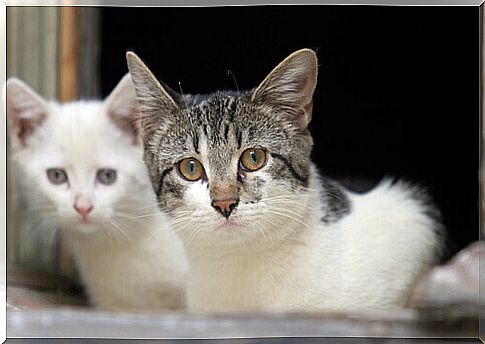
If your kitten has health problems, he or she will not always be able to communicate this clearly to you. For this reason it is important that you observe it and pay attention to some details that could indicate the presence of a health problem, whether it is a minor nuisance without importance, or whether it is a serious illness. In any case, a visit to the vet, so that he can accurately indicate the appropriate treatments, is always the best choice.
Some symptoms to consider
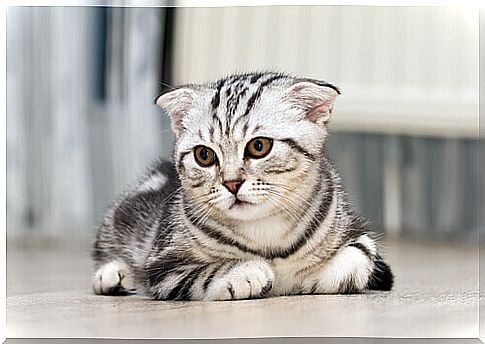
There are several signs that can indicate the presence of various health problems: a visit to the vet at the first sign will save you and your cat from further and more harassment.
Let’s look at some of these signs:
- weight loss is one of the first visible symptoms of kidney failure, followed by excessive water consumption and then anorexia. Unfortunately, when these symptoms appear, the disease is already in an advanced state.
- Weight loss can also be caused by some internal parasites or by diabetes. In the first case, vomiting, diarrhea, loss of shine in the hair and loss of appetite also appear . If, on the other hand, it is diabetes, you will immediately notice that your cat drinks too much and urinates to excess.
- If your furry friend goes to his box too many times or if he pees, or at least tries, on other horizontal surfaces – such as beds, sofas, armchairs – and later licks his private parts frequently, it is almost certainly cystitis. or some kind of urinary obstruction. If you try to defecate several times but fail, then it could be a bowel obstruction.
- If your cat meows incessantly, day and night, and seemingly for no reason, it could be because of deafness.
- Swelling in some parts of the body could be attributed to the presence of an abscess. This accumulation of pus in the deep layer of the skin is the result of a bite or scratch. As always happens when it comes to an infection, the cat appears dejected.
- If he moves his head or tilts it to one side, if he scratches constantly or has suppuration in one ear, he is certainly suffering from otitis.
- Bad breath, chewing on one side only or not chewing at all and not eating, indicate a clear dental problem.
- Collapses and fainting can be caused by a cardiovascular or nervous system problem.
- Motor difficulties are linked to muscle and bone problems.
- If you have scabs and ulcers on your skin, this may indicate scabies or ringworm.
- Watery, purging eyes and inflammation in the eyelids are signs of chlamydiosis.
- Colds and allergies can instead manifest themselves through the following symptoms:
- Sneezing
- Noisy breathing
- Mucus
- Watery eyes
- Cough
- Nasal or chest congestion
- Temperature
Symptoms of other health problems in a cat
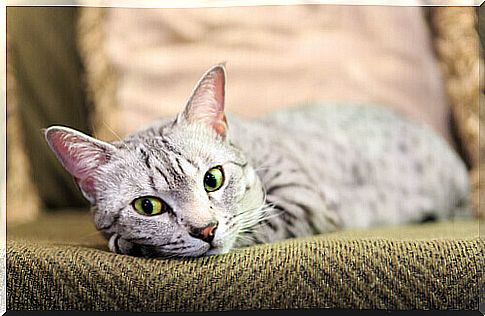
Below we want to list some other diseases that cats usually suffer from and their symptoms that will help you identify them.
- Coccidiosis: is an intestinal disorder caused by internal parasites. Symptoms are diarrhea, bleeding, anemia, dehydration, weight loss, vomiting, signs of pain in palpating the abdomen and belly.
- Feline panleukopenia (FLP) or feline infectious gastroenteritis: is an infectious disease caused by a parvovirus and transmitted through urine and feces. It causes loss of appetite, fever, frothy vomit, abdominal pain and yellowish-greyish or hemorrhagic, dark and smelly droppings.
- Calicivirosis (FCV): is an acute viral form of the common cold. Has moderate fever, sneezing, increased salivation, ulcers within the oral cavity and blisters on the tongue.
- Feline viral rhinotracheitis (FRV): it is a pathology of the upper respiratory tract. During its course it causes respiratory disorders, fever, mucus, sneezing, conjunctivitis, excessive tearing, cough, ulceration of the corneas.
- Feline leukemia (FeLV): this infection is transmitted through contact with other animals carrying the disease; between the moment of contagion and the onset of clinical symptoms, it can take several years. The most frequent symptoms are lack of appetite, lethargy, weakness and anemia.
- Feline Infectious Peritonitis (FIP): This is an infectious disease that mainly affects cats living in large feline colonies. It is characterized by general weakening, abdominal distension, and pulmonary and abdominal edema.
- Anger: affects the central nervous system and causes changes in character in the animal, paralysis of the muscles of the throat and jaws – causing difficulty in eating and drinking, other than a constant grimace in the muzzle – and abundant production of drool.
- Typhus: destroys the cells of the immune system, causing a drastic decrease in the animal’s defenses. During the course, vomiting, diarrhea and fever appear.
- Coriza: inflammation of the airways that causes constant nasal and ocular discharge, sneezing, fever and ulcerative lesions within the oral cavity.
- Bronchopneumonia: is an acute inflammation of the bronchi and pulmonary alveoli. It is accompanied by symptoms such as cough, fever, phlegm, purulent mucus discharge, impaired senses and breathing difficulties.
Remember that a healthy and fit cat moves with ease, climbs, jumps, eats with appetite and takes care of their own personal cleaning with great precision. The lack of these habitual attitudes can in itself indicate the presence of some health problem in your cat. If he doesn’t get better in a reasonably short time, don’t think twice and take him to the vet – it’s wise to always keep his number and address on hand, just in case. Surely taking care of your furry friend’s health is the best way to show him how much you love him.

